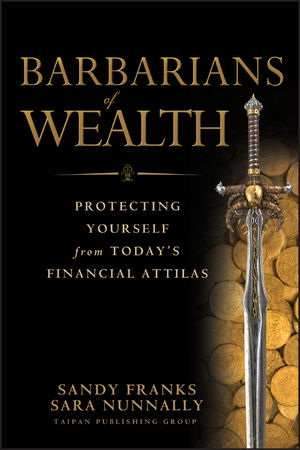Barbarians of Wealth: Protecting Yourself from Today's Financial AttilasISBN: 978-0-470-76814-3
Hardcover
448 pages
December 2010
 This is a Print-on-Demand title. It will be printed specifically to fill your order. Please allow an additional 10-15 days delivery time. The book is not returnable.
|
||||||
Connect with Wiley Publicity
The Huns, The Vikings, Charlemagne, Genghis Khan. These groups and individuals are infamous for changing history and for the methods they used to force their rule on dozens of provinces and territories. Their names are also associated with the suffering of millions and the lavish lives they lived as a result of their conquests.
Sandy Franks and Sara Nunnally’s new book BARBARIANS OF WEALTH: Protecting Yourself from Today’s Financial Attilas (Wiley; Hardcover; December 2010; $29.95 ISBN: 978-0-470-76814-3) demonstrates how these historic predators are not so different from the financial barbarian of current times, which include now historic names such as Goldman Sachs, AIG, Alan Greenspan and the U.S. banking industry, including the Federal Reserve.
How are barbarians characterized? In their book, Franks and Nunnally describe a barbarian as someone who is either unaware of or unwilling to abide by the rules of civilized life. They are willing to lie, cheat and steal to reach their goals. These definitions apply to those groups that pillaged and conquered empires throughout history, forever altering the lives of millions, but it also holds true today. Many top Wall Street, banking and government officials that were involved with the decisions that directly impacted the U.S. economy and ultimately the prosperity of the American people, engaged in the tactics of lying, cheating and stealing just as the barbarians of The Dark Ages.
The book blends the history of the Federal Reserve, banking system, modern day Wall Street institutions and congress and draws comparisons to barbarians of the dark ages. It explains how, under barbaric leadership fraught with megalomania, credit bubbles were built and prosperity was destroyed.
BARBARIANS OF WEALTH digs deep into the barbarians of The Dark Ages, explaining how the damage most history books explain as kingdom expansion or triumph truly affected those living under the rule of these leaders. The book also does the same with the barbarians of recent history who, under the guise of protecting the American economy, damaged countless Americans’ finances and in turn, their well-being.
Franks and Nunnally examine how the greedy, self-serving decisions of a select group of politicians and financial institutions negatively impacted the economy and ultimately, destroyed the American way of life. Compelling and engaging, the book:
- Gives a concise history of the world’s most legendary barbarians, tying each to modern barbarians, including the Federal Reserve, Alan Greenspan, Hank Paulson, and Timothy Geithner.
- Highlights greed driven tactics of Wall Street corporations including JP Morgan, Merrill Lynch, and Salomon Brothers.
- Shares details about how Goldman Sachs peddled mortgage backed securities up and down Wall Street while secretly betting against their demise
- Discusses how Sanford Weill, founder of Citigroup spent $100 million lobbying for the repeal of the Glass-Steagall Act that prevented the merger of commercial and investment banks and got his way.
- Examines Christopher Dodd, head of the U.S. Senate Banking Committee, has enriched himself while driving down the prosperity of his constituents
Franks and Nunnally not only touch upon the comparisons between modern day and historic barbarians, but they also give readers tips on avoiding their wrath and how to protect themselves and their wealth. Today’s financial barbarians are using tricks such as credit card fees, bailouts and other shady tactics to get their hands on money that is not theirs. The last few chapters of the book give readers advice on safeguarding their finances and explore strategies such as diversifying a portfolio, hedging against inflation and even ways to use the barbarians weapons against them.



